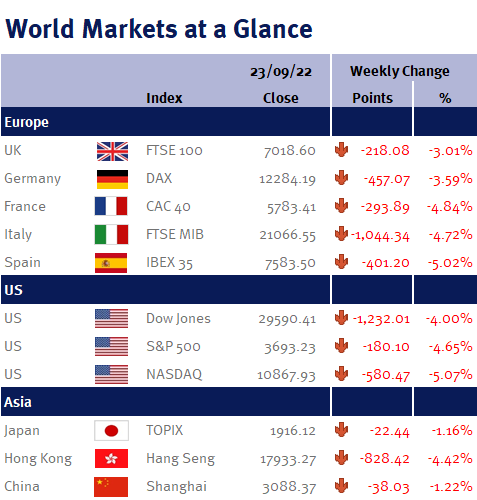As expected (and priced-in by financial markets), the Fed policymakers increased US interest rates by 0.75% (their third straight 0.75% increase in a row), and as we expected, their accompanying statement didn’t contain any major surprises given policymakers have made it clear that their focus is on restoring price stability.
However, what was a shocker was their ‘dot-plot’.
The dot-plot is designed to show each policymaker’s interest rate forecast for each of the next three years. Not only did this week’s revised dot-plot imply that US interest rates will be 1.25% higher by the end of the year, but will remain higher than expected over the next two years.
We believe that this impatience from Fed policymakers now makes a US recession unavoidable. And by increasing interest rates too far and too fast they will soon become Milton Friedman’s ‘the fool-in-the-shower’ (where a person gets burnt by hot water after they turn the hot water all they up given the shower water initially came through cold – in other words, Fed policymakers are currently aggressively increasing interest rates without taking into account the impact of their previous increases).
However, the end result will be a realisation (in our opinion, sometime during 2023) that they have overshot the runway in aggressively increasing interest rates, resulting in an about-turn – which will be positive for global equity markets.
In the UK, the BoE resisted the urged for the jumbo interest rate increase seen elsewhere and opted for an increase of just 0.50%. While the three-way split in policymaker voting (five voted for 0.50%; three voted for 0.75%; and one voted for 0.25%) was interesting yesterday, this quickly became irrelevant thanks to today’s mini-budget. Given the announced fiscal policy changes, financial markets have now priced-in a 1% increase in interest rates when BoE policymakers next meet on 3 November 2022 – which will really squeeze homeowners with variable rate mortgages or those with fixed rates that will soon expire.
Whilst technically Kwasi Kwarteng (our new Chancellor of the Exchequer) today delivered a ‘mini’ budget, it felt more like a full-blown budget given all the fiscal changes – no one can accuse Liz Truss of not following through on her election campaign message! A summary of today’s announcements can be found here.
Although many of the announcements had already been released, the main surprise to us was the fact that Kwasi Kwarteng only focused on the reversal of previously announced tax increases, tax cuts and supply-side reforms, and didn’t really mention any revenue-raising measures.
Unfortunately, because it wasn’t a budget, there was no accompanying assessment of the proposed changes from the Office for Budget Responsibility (OBR) – and so there were no growth or inflation forecasts to show the impact of the policy changes, which wasn’t taken well by financial markets and consequently, we saw both the pound and gilt prices sell-off (and unfortunately, a weaker pound will only exacerbate UK inflation as it will make our imports more expensive).
However, it should be noted that any OBR assessment is akin to putting a finger in the air as the eventual cost will ultimately depend on what happens with global energy prices as the Government’s £2,500 energy price-cap is effectively a blank cheque – in other words: how cold this winter turns out; and what happens in Ukraine/Russia.
Looking ahead to this coming week in the US we have durable goods orders; housing data; consumer confidence; and PCE data. Elsewhere we have Eurozone unemployment; index; Eurozone CPI inflation; Chinese & Japanese PMI; Japanese industrial production; and Italy will elect a new government.
Investment Management Team


